Jurisprudence: Contrasting Natural Law Theory and Legal Positivism
VerifiedAdded on 2020/04/01
|12
|3190
|411
Essay
AI Summary
This essay delves into the complex relationship between natural law theory and legal positivism within the field of jurisprudence. It begins by defining and contrasting the two theories, highlighting natural law's emphasis on justice, equality, and morality, and legal positivism's focus on the social facts of law. The paper examines the historical development and key proponents of each school of thought, including Aristotle, Thomas Aquinas, John Austin, and H.L.A. Hart. It explores the arguments for and against each theory, addressing criticisms and misunderstandings. The essay analyzes the ways in which positive law draws inspiration from natural law, particularly in democratic societies, and discusses the importance of consciousness in shaping social struggles and legal frameworks. The conclusion emphasizes the ongoing relevance of both natural law and legal positivism in understanding the nature and function of law, and their implications for justice, governance, and individual rights.
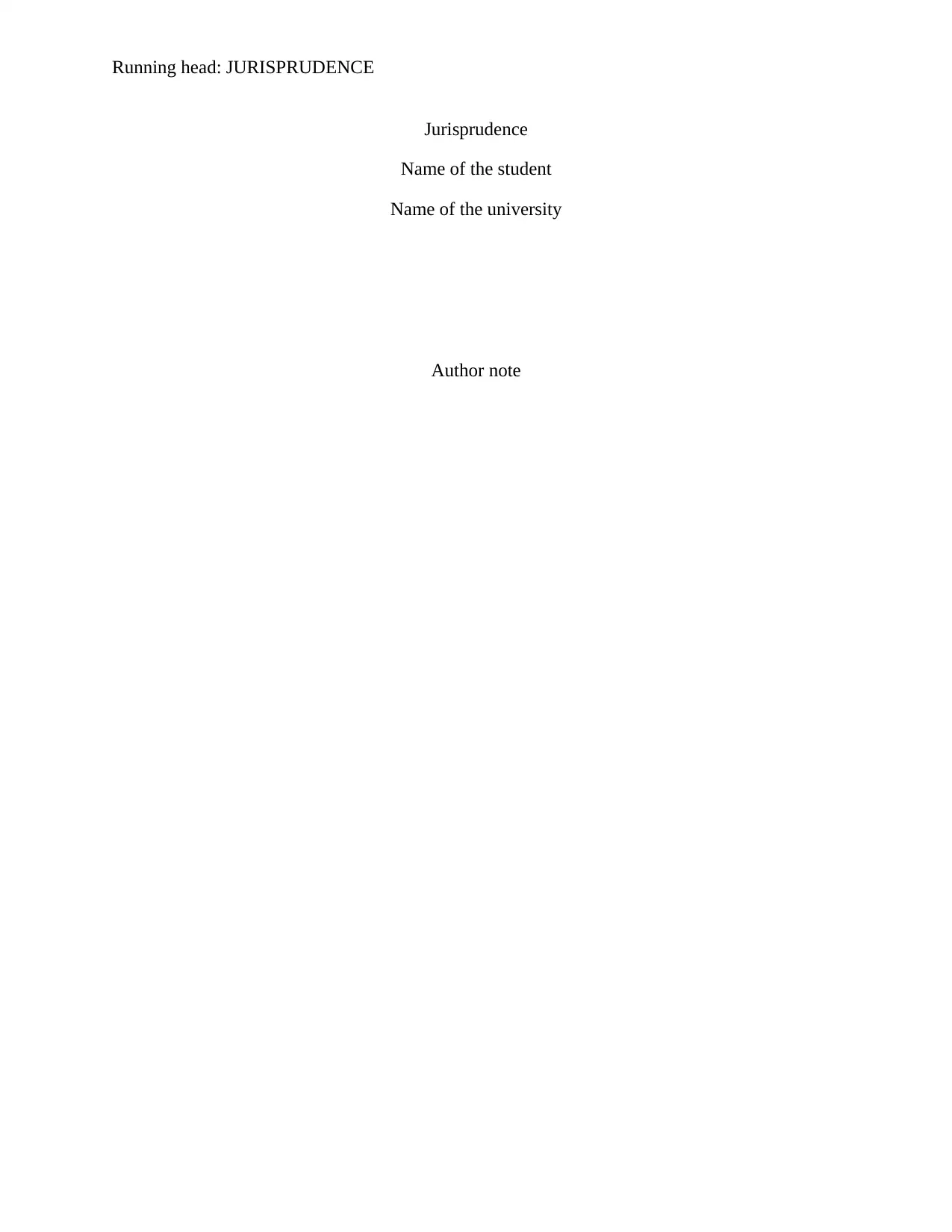
Running head: JURISPRUDENCE
Jurisprudence
Name of the student
Name of the university
Author note
Jurisprudence
Name of the student
Name of the university
Author note
Paraphrase This Document
Need a fresh take? Get an instant paraphrase of this document with our AI Paraphraser
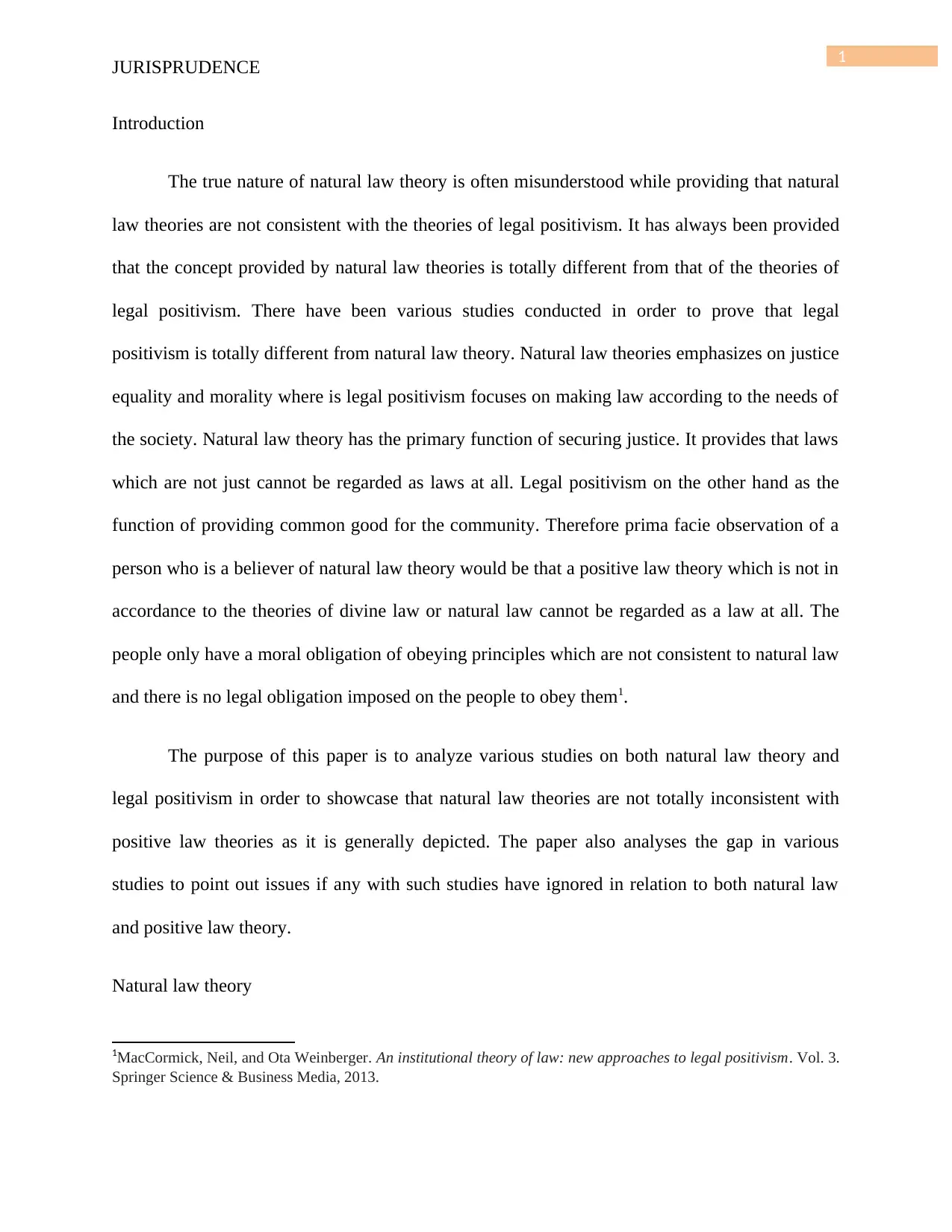
1
JURISPRUDENCE
Introduction
The true nature of natural law theory is often misunderstood while providing that natural
law theories are not consistent with the theories of legal positivism. It has always been provided
that the concept provided by natural law theories is totally different from that of the theories of
legal positivism. There have been various studies conducted in order to prove that legal
positivism is totally different from natural law theory. Natural law theories emphasizes on justice
equality and morality where is legal positivism focuses on making law according to the needs of
the society. Natural law theory has the primary function of securing justice. It provides that laws
which are not just cannot be regarded as laws at all. Legal positivism on the other hand as the
function of providing common good for the community. Therefore prima facie observation of a
person who is a believer of natural law theory would be that a positive law theory which is not in
accordance to the theories of divine law or natural law cannot be regarded as a law at all. The
people only have a moral obligation of obeying principles which are not consistent to natural law
and there is no legal obligation imposed on the people to obey them1.
The purpose of this paper is to analyze various studies on both natural law theory and
legal positivism in order to showcase that natural law theories are not totally inconsistent with
positive law theories as it is generally depicted. The paper also analyses the gap in various
studies to point out issues if any with such studies have ignored in relation to both natural law
and positive law theory.
Natural law theory
1MacCormick, Neil, and Ota Weinberger. An institutional theory of law: new approaches to legal positivism. Vol. 3.
Springer Science & Business Media, 2013.
JURISPRUDENCE
Introduction
The true nature of natural law theory is often misunderstood while providing that natural
law theories are not consistent with the theories of legal positivism. It has always been provided
that the concept provided by natural law theories is totally different from that of the theories of
legal positivism. There have been various studies conducted in order to prove that legal
positivism is totally different from natural law theory. Natural law theories emphasizes on justice
equality and morality where is legal positivism focuses on making law according to the needs of
the society. Natural law theory has the primary function of securing justice. It provides that laws
which are not just cannot be regarded as laws at all. Legal positivism on the other hand as the
function of providing common good for the community. Therefore prima facie observation of a
person who is a believer of natural law theory would be that a positive law theory which is not in
accordance to the theories of divine law or natural law cannot be regarded as a law at all. The
people only have a moral obligation of obeying principles which are not consistent to natural law
and there is no legal obligation imposed on the people to obey them1.
The purpose of this paper is to analyze various studies on both natural law theory and
legal positivism in order to showcase that natural law theories are not totally inconsistent with
positive law theories as it is generally depicted. The paper also analyses the gap in various
studies to point out issues if any with such studies have ignored in relation to both natural law
and positive law theory.
Natural law theory
1MacCormick, Neil, and Ota Weinberger. An institutional theory of law: new approaches to legal positivism. Vol. 3.
Springer Science & Business Media, 2013.
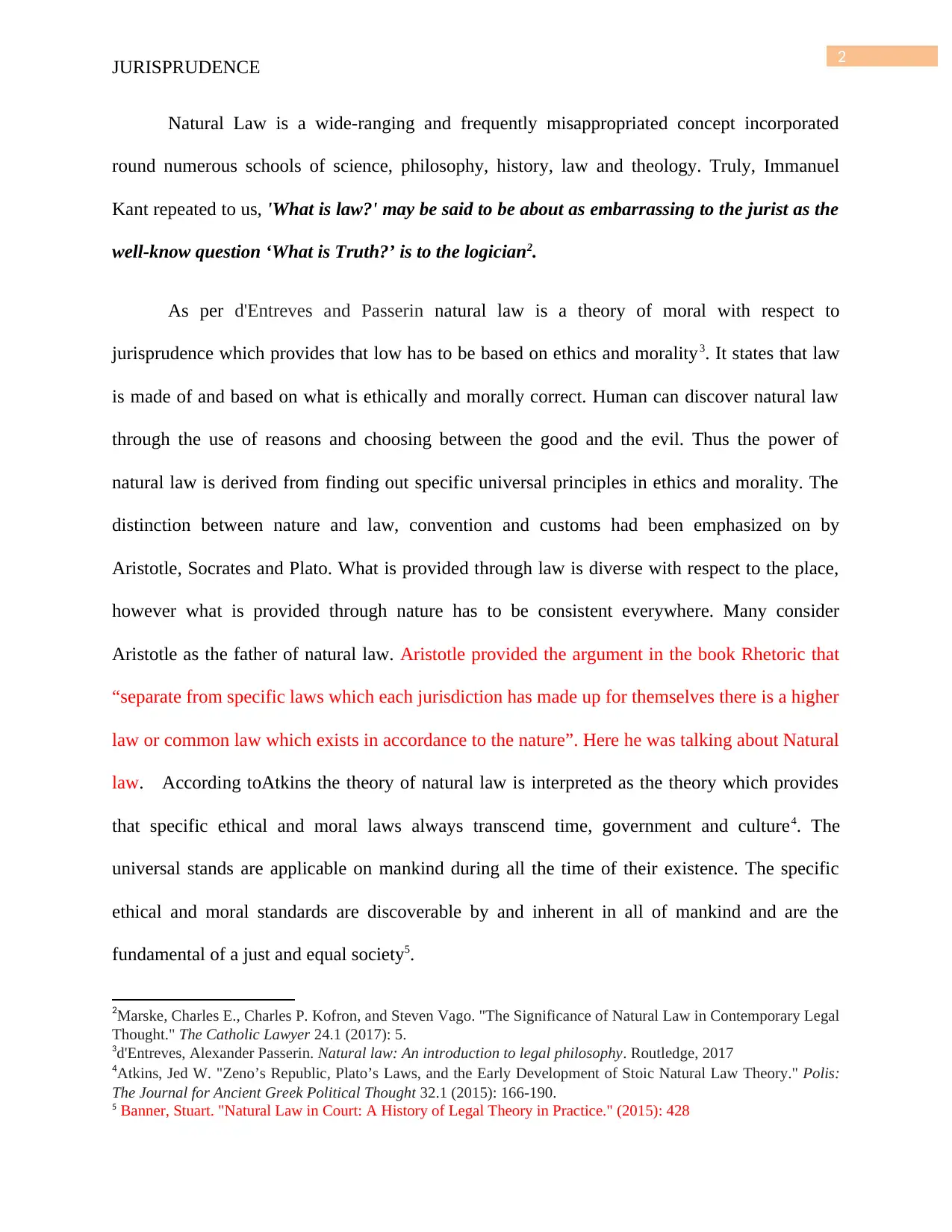
2
JURISPRUDENCE
Natural Law is a wide-ranging and frequently misappropriated concept incorporated
round numerous schools of science, philosophy, history, law and theology. Truly, Immanuel
Kant repeated to us, 'What is law?' may be said to be about as embarrassing to the jurist as the
well-know question ‘What is Truth?’ is to the logician2.
As per d'Entreves and Passerin natural law is a theory of moral with respect to
jurisprudence which provides that low has to be based on ethics and morality3. It states that law
is made of and based on what is ethically and morally correct. Human can discover natural law
through the use of reasons and choosing between the good and the evil. Thus the power of
natural law is derived from finding out specific universal principles in ethics and morality. The
distinction between nature and law, convention and customs had been emphasized on by
Aristotle, Socrates and Plato. What is provided through law is diverse with respect to the place,
however what is provided through nature has to be consistent everywhere. Many consider
Aristotle as the father of natural law. Aristotle provided the argument in the book Rhetoric that
“separate from specific laws which each jurisdiction has made up for themselves there is a higher
law or common law which exists in accordance to the nature”. Here he was talking about Natural
law. According toAtkins the theory of natural law is interpreted as the theory which provides
that specific ethical and moral laws always transcend time, government and culture4. The
universal stands are applicable on mankind during all the time of their existence. The specific
ethical and moral standards are discoverable by and inherent in all of mankind and are the
fundamental of a just and equal society5.
2Marske, Charles E., Charles P. Kofron, and Steven Vago. "The Significance of Natural Law in Contemporary Legal
Thought." The Catholic Lawyer 24.1 (2017): 5.
3d'Entreves, Alexander Passerin. Natural law: An introduction to legal philosophy. Routledge, 2017
4Atkins, Jed W. "Zeno’s Republic, Plato’s Laws, and the Early Development of Stoic Natural Law Theory." Polis:
The Journal for Ancient Greek Political Thought 32.1 (2015): 166-190.
5 Banner, Stuart. "Natural Law in Court: A History of Legal Theory in Practice." (2015): 428
JURISPRUDENCE
Natural Law is a wide-ranging and frequently misappropriated concept incorporated
round numerous schools of science, philosophy, history, law and theology. Truly, Immanuel
Kant repeated to us, 'What is law?' may be said to be about as embarrassing to the jurist as the
well-know question ‘What is Truth?’ is to the logician2.
As per d'Entreves and Passerin natural law is a theory of moral with respect to
jurisprudence which provides that low has to be based on ethics and morality3. It states that law
is made of and based on what is ethically and morally correct. Human can discover natural law
through the use of reasons and choosing between the good and the evil. Thus the power of
natural law is derived from finding out specific universal principles in ethics and morality. The
distinction between nature and law, convention and customs had been emphasized on by
Aristotle, Socrates and Plato. What is provided through law is diverse with respect to the place,
however what is provided through nature has to be consistent everywhere. Many consider
Aristotle as the father of natural law. Aristotle provided the argument in the book Rhetoric that
“separate from specific laws which each jurisdiction has made up for themselves there is a higher
law or common law which exists in accordance to the nature”. Here he was talking about Natural
law. According toAtkins the theory of natural law is interpreted as the theory which provides
that specific ethical and moral laws always transcend time, government and culture4. The
universal stands are applicable on mankind during all the time of their existence. The specific
ethical and moral standards are discoverable by and inherent in all of mankind and are the
fundamental of a just and equal society5.
2Marske, Charles E., Charles P. Kofron, and Steven Vago. "The Significance of Natural Law in Contemporary Legal
Thought." The Catholic Lawyer 24.1 (2017): 5.
3d'Entreves, Alexander Passerin. Natural law: An introduction to legal philosophy. Routledge, 2017
4Atkins, Jed W. "Zeno’s Republic, Plato’s Laws, and the Early Development of Stoic Natural Law Theory." Polis:
The Journal for Ancient Greek Political Thought 32.1 (2015): 166-190.
5 Banner, Stuart. "Natural Law in Court: A History of Legal Theory in Practice." (2015): 428
⊘ This is a preview!⊘
Do you want full access?
Subscribe today to unlock all pages.

Trusted by 1+ million students worldwide
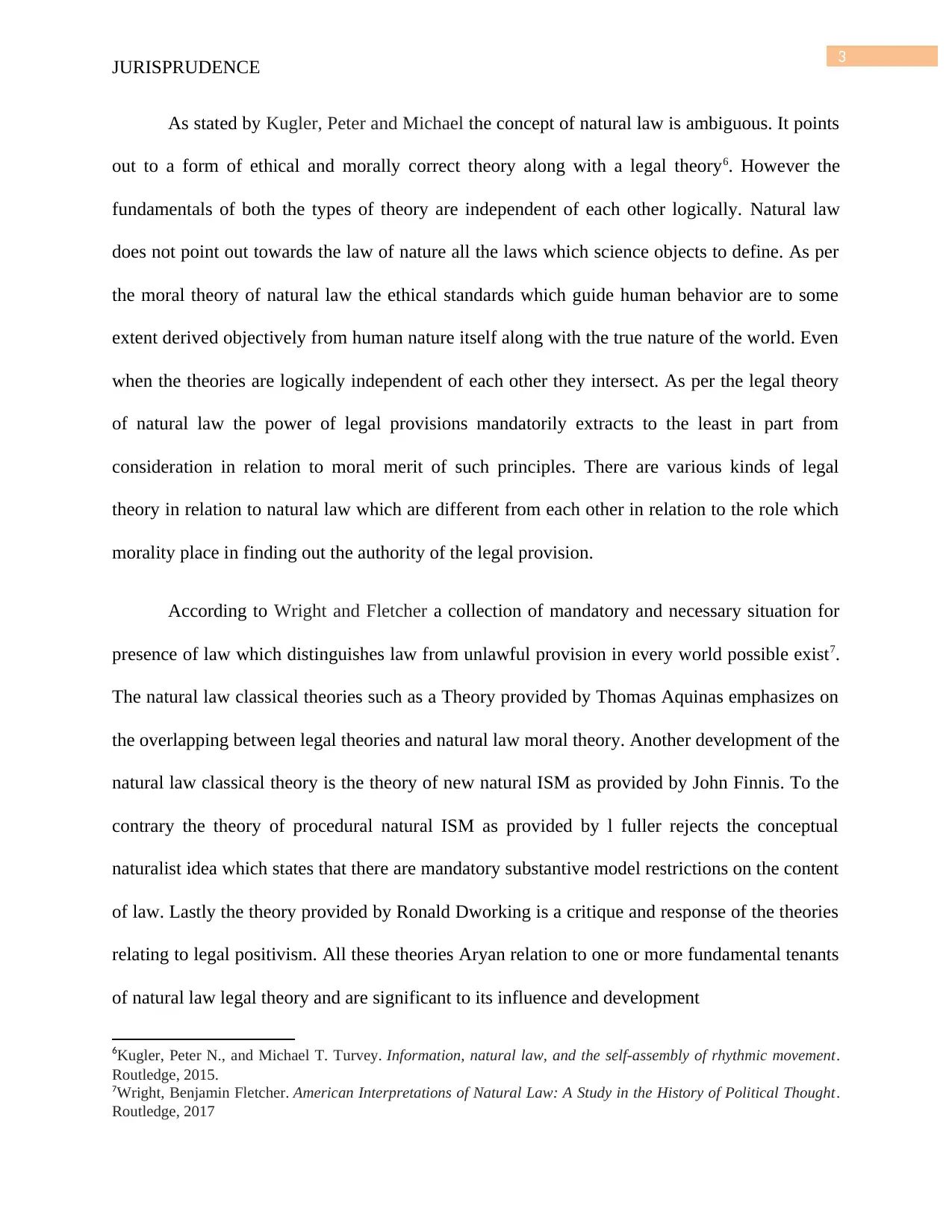
3
JURISPRUDENCE
As stated by Kugler, Peter and Michael the concept of natural law is ambiguous. It points
out to a form of ethical and morally correct theory along with a legal theory6. However the
fundamentals of both the types of theory are independent of each other logically. Natural law
does not point out towards the law of nature all the laws which science objects to define. As per
the moral theory of natural law the ethical standards which guide human behavior are to some
extent derived objectively from human nature itself along with the true nature of the world. Even
when the theories are logically independent of each other they intersect. As per the legal theory
of natural law the power of legal provisions mandatorily extracts to the least in part from
consideration in relation to moral merit of such principles. There are various kinds of legal
theory in relation to natural law which are different from each other in relation to the role which
morality place in finding out the authority of the legal provision.
According to Wright and Fletcher a collection of mandatory and necessary situation for
presence of law which distinguishes law from unlawful provision in every world possible exist7.
The natural law classical theories such as a Theory provided by Thomas Aquinas emphasizes on
the overlapping between legal theories and natural law moral theory. Another development of the
natural law classical theory is the theory of new natural ISM as provided by John Finnis. To the
contrary the theory of procedural natural ISM as provided by l fuller rejects the conceptual
naturalist idea which states that there are mandatory substantive model restrictions on the content
of law. Lastly the theory provided by Ronald Dworking is a critique and response of the theories
relating to legal positivism. All these theories Aryan relation to one or more fundamental tenants
of natural law legal theory and are significant to its influence and development
6Kugler, Peter N., and Michael T. Turvey. Information, natural law, and the self-assembly of rhythmic movement.
Routledge, 2015.
7Wright, Benjamin Fletcher. American Interpretations of Natural Law: A Study in the History of Political Thought.
Routledge, 2017
JURISPRUDENCE
As stated by Kugler, Peter and Michael the concept of natural law is ambiguous. It points
out to a form of ethical and morally correct theory along with a legal theory6. However the
fundamentals of both the types of theory are independent of each other logically. Natural law
does not point out towards the law of nature all the laws which science objects to define. As per
the moral theory of natural law the ethical standards which guide human behavior are to some
extent derived objectively from human nature itself along with the true nature of the world. Even
when the theories are logically independent of each other they intersect. As per the legal theory
of natural law the power of legal provisions mandatorily extracts to the least in part from
consideration in relation to moral merit of such principles. There are various kinds of legal
theory in relation to natural law which are different from each other in relation to the role which
morality place in finding out the authority of the legal provision.
According to Wright and Fletcher a collection of mandatory and necessary situation for
presence of law which distinguishes law from unlawful provision in every world possible exist7.
The natural law classical theories such as a Theory provided by Thomas Aquinas emphasizes on
the overlapping between legal theories and natural law moral theory. Another development of the
natural law classical theory is the theory of new natural ISM as provided by John Finnis. To the
contrary the theory of procedural natural ISM as provided by l fuller rejects the conceptual
naturalist idea which states that there are mandatory substantive model restrictions on the content
of law. Lastly the theory provided by Ronald Dworking is a critique and response of the theories
relating to legal positivism. All these theories Aryan relation to one or more fundamental tenants
of natural law legal theory and are significant to its influence and development
6Kugler, Peter N., and Michael T. Turvey. Information, natural law, and the self-assembly of rhythmic movement.
Routledge, 2015.
7Wright, Benjamin Fletcher. American Interpretations of Natural Law: A Study in the History of Political Thought.
Routledge, 2017
Paraphrase This Document
Need a fresh take? Get an instant paraphrase of this document with our AI Paraphraser
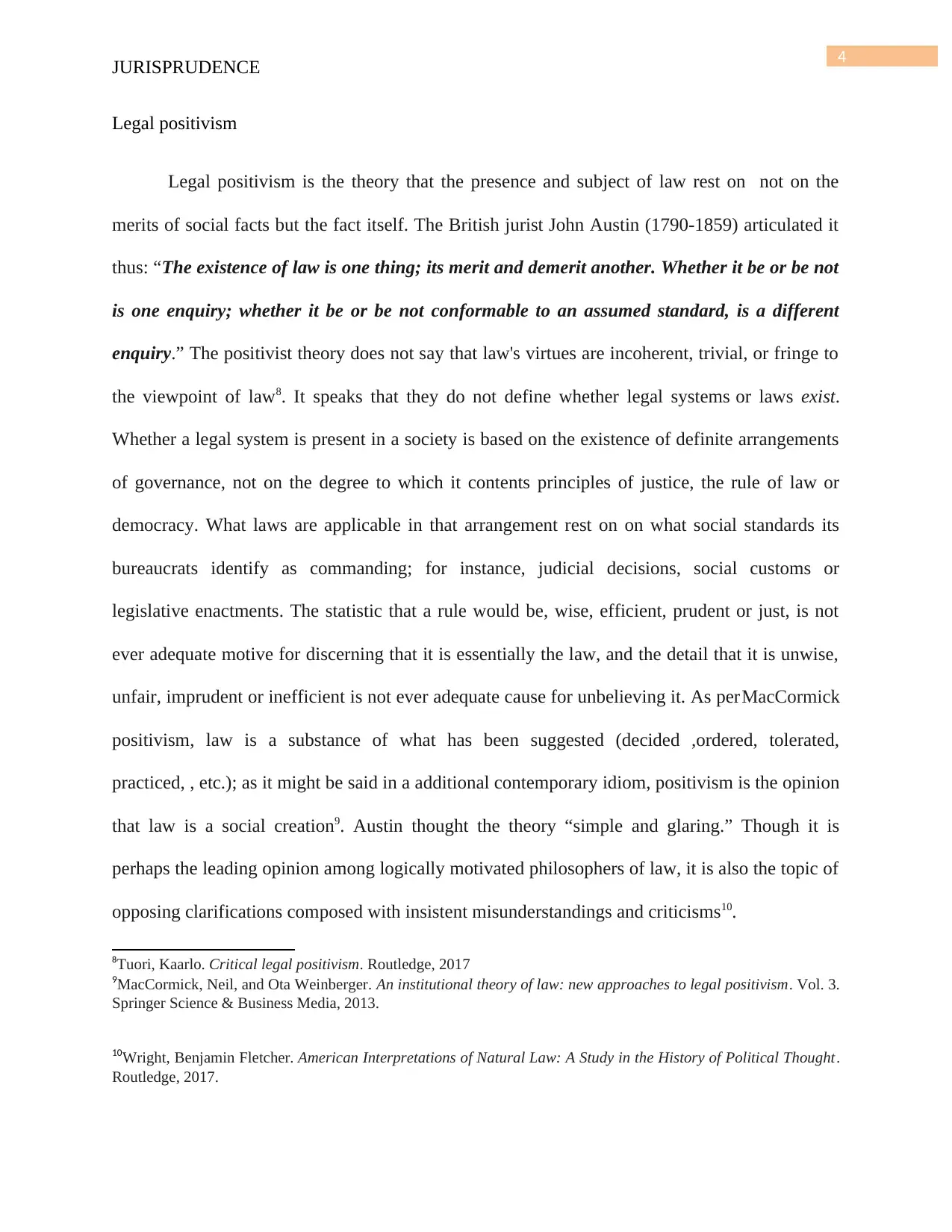
4
JURISPRUDENCE
Legal positivism
Legal positivism is the theory that the presence and subject of law rest on not on the
merits of social facts but the fact itself. The British jurist John Austin (1790-1859) articulated it
thus: “The existence of law is one thing; its merit and demerit another. Whether it be or be not
is one enquiry; whether it be or be not conformable to an assumed standard, is a different
enquiry.” The positivist theory does not say that law's virtues are incoherent, trivial, or fringe to
the viewpoint of law8. It speaks that they do not define whether legal systems or laws exist.
Whether a legal system is present in a society is based on the existence of definite arrangements
of governance, not on the degree to which it contents principles of justice, the rule of law or
democracy. What laws are applicable in that arrangement rest on on what social standards its
bureaucrats identify as commanding; for instance, judicial decisions, social customs or
legislative enactments. The statistic that a rule would be, wise, efficient, prudent or just, is not
ever adequate motive for discerning that it is essentially the law, and the detail that it is unwise,
unfair, imprudent or inefficient is not ever adequate cause for unbelieving it. As perMacCormick
positivism, law is a substance of what has been suggested (decided ,ordered, tolerated,
practiced, , etc.); as it might be said in a additional contemporary idiom, positivism is the opinion
that law is a social creation9. Austin thought the theory “simple and glaring.” Though it is
perhaps the leading opinion among logically motivated philosophers of law, it is also the topic of
opposing clarifications composed with insistent misunderstandings and criticisms10.
8Tuori, Kaarlo. Critical legal positivism. Routledge, 2017
9MacCormick, Neil, and Ota Weinberger. An institutional theory of law: new approaches to legal positivism. Vol. 3.
Springer Science & Business Media, 2013.
10Wright, Benjamin Fletcher. American Interpretations of Natural Law: A Study in the History of Political Thought.
Routledge, 2017.
JURISPRUDENCE
Legal positivism
Legal positivism is the theory that the presence and subject of law rest on not on the
merits of social facts but the fact itself. The British jurist John Austin (1790-1859) articulated it
thus: “The existence of law is one thing; its merit and demerit another. Whether it be or be not
is one enquiry; whether it be or be not conformable to an assumed standard, is a different
enquiry.” The positivist theory does not say that law's virtues are incoherent, trivial, or fringe to
the viewpoint of law8. It speaks that they do not define whether legal systems or laws exist.
Whether a legal system is present in a society is based on the existence of definite arrangements
of governance, not on the degree to which it contents principles of justice, the rule of law or
democracy. What laws are applicable in that arrangement rest on on what social standards its
bureaucrats identify as commanding; for instance, judicial decisions, social customs or
legislative enactments. The statistic that a rule would be, wise, efficient, prudent or just, is not
ever adequate motive for discerning that it is essentially the law, and the detail that it is unwise,
unfair, imprudent or inefficient is not ever adequate cause for unbelieving it. As perMacCormick
positivism, law is a substance of what has been suggested (decided ,ordered, tolerated,
practiced, , etc.); as it might be said in a additional contemporary idiom, positivism is the opinion
that law is a social creation9. Austin thought the theory “simple and glaring.” Though it is
perhaps the leading opinion among logically motivated philosophers of law, it is also the topic of
opposing clarifications composed with insistent misunderstandings and criticisms10.
8Tuori, Kaarlo. Critical legal positivism. Routledge, 2017
9MacCormick, Neil, and Ota Weinberger. An institutional theory of law: new approaches to legal positivism. Vol. 3.
Springer Science & Business Media, 2013.
10Wright, Benjamin Fletcher. American Interpretations of Natural Law: A Study in the History of Political Thought.
Routledge, 2017.
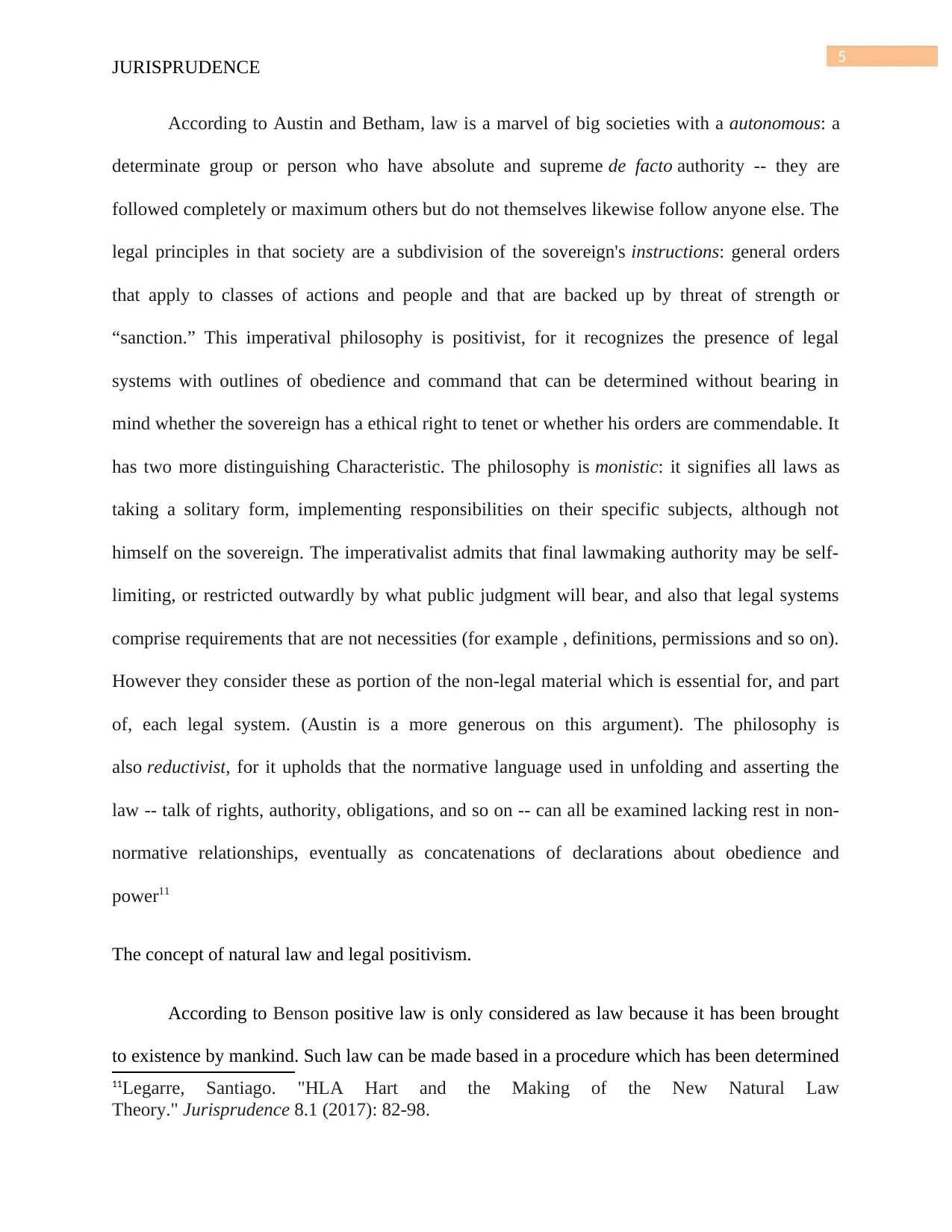
5
JURISPRUDENCE
According to Austin and Betham, law is a marvel of big societies with a autonomous: a
determinate group or person who have absolute and supreme de facto authority -- they are
followed completely or maximum others but do not themselves likewise follow anyone else. The
legal principles in that society are a subdivision of the sovereign's instructions: general orders
that apply to classes of actions and people and that are backed up by threat of strength or
“sanction.” This imperatival philosophy is positivist, for it recognizes the presence of legal
systems with outlines of obedience and command that can be determined without bearing in
mind whether the sovereign has a ethical right to tenet or whether his orders are commendable. It
has two more distinguishing Characteristic. The philosophy is monistic: it signifies all laws as
taking a solitary form, implementing responsibilities on their specific subjects, although not
himself on the sovereign. The imperativalist admits that final lawmaking authority may be self-
limiting, or restricted outwardly by what public judgment will bear, and also that legal systems
comprise requirements that are not necessities (for example , definitions, permissions and so on).
However they consider these as portion of the non-legal material which is essential for, and part
of, each legal system. (Austin is a more generous on this argument). The philosophy is
also reductivist, for it upholds that the normative language used in unfolding and asserting the
law -- talk of rights, authority, obligations, and so on -- can all be examined lacking rest in non-
normative relationships, eventually as concatenations of declarations about obedience and
power11
The concept of natural law and legal positivism.
According to Benson positive law is only considered as law because it has been brought
to existence by mankind. Such law can be made based in a procedure which has been determined
11Legarre, Santiago. "HLA Hart and the Making of the New Natural Law
Theory." Jurisprudence 8.1 (2017): 82-98.
JURISPRUDENCE
According to Austin and Betham, law is a marvel of big societies with a autonomous: a
determinate group or person who have absolute and supreme de facto authority -- they are
followed completely or maximum others but do not themselves likewise follow anyone else. The
legal principles in that society are a subdivision of the sovereign's instructions: general orders
that apply to classes of actions and people and that are backed up by threat of strength or
“sanction.” This imperatival philosophy is positivist, for it recognizes the presence of legal
systems with outlines of obedience and command that can be determined without bearing in
mind whether the sovereign has a ethical right to tenet or whether his orders are commendable. It
has two more distinguishing Characteristic. The philosophy is monistic: it signifies all laws as
taking a solitary form, implementing responsibilities on their specific subjects, although not
himself on the sovereign. The imperativalist admits that final lawmaking authority may be self-
limiting, or restricted outwardly by what public judgment will bear, and also that legal systems
comprise requirements that are not necessities (for example , definitions, permissions and so on).
However they consider these as portion of the non-legal material which is essential for, and part
of, each legal system. (Austin is a more generous on this argument). The philosophy is
also reductivist, for it upholds that the normative language used in unfolding and asserting the
law -- talk of rights, authority, obligations, and so on -- can all be examined lacking rest in non-
normative relationships, eventually as concatenations of declarations about obedience and
power11
The concept of natural law and legal positivism.
According to Benson positive law is only considered as law because it has been brought
to existence by mankind. Such law can be made based in a procedure which has been determined
11Legarre, Santiago. "HLA Hart and the Making of the New Natural Law
Theory." Jurisprudence 8.1 (2017): 82-98.
⊘ This is a preview!⊘
Do you want full access?
Subscribe today to unlock all pages.

Trusted by 1+ million students worldwide
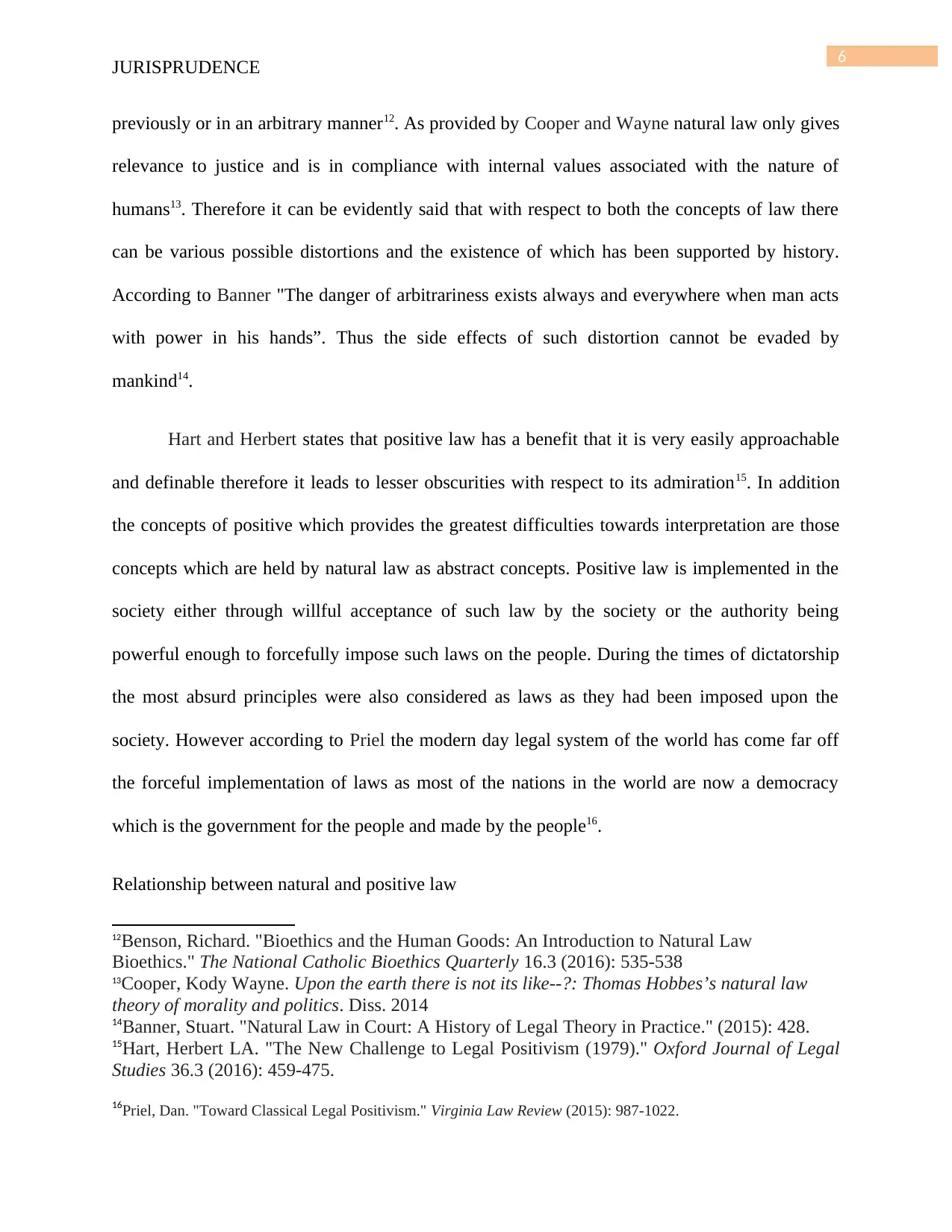
6
JURISPRUDENCE
previously or in an arbitrary manner12. As provided by Cooper and Wayne natural law only gives
relevance to justice and is in compliance with internal values associated with the nature of
humans13. Therefore it can be evidently said that with respect to both the concepts of law there
can be various possible distortions and the existence of which has been supported by history.
According to Banner "The danger of arbitrariness exists always and everywhere when man acts
with power in his hands”. Thus the side effects of such distortion cannot be evaded by
mankind14.
Hart and Herbert states that positive law has a benefit that it is very easily approachable
and definable therefore it leads to lesser obscurities with respect to its admiration15. In addition
the concepts of positive which provides the greatest difficulties towards interpretation are those
concepts which are held by natural law as abstract concepts. Positive law is implemented in the
society either through willful acceptance of such law by the society or the authority being
powerful enough to forcefully impose such laws on the people. During the times of dictatorship
the most absurd principles were also considered as laws as they had been imposed upon the
society. However according to Priel the modern day legal system of the world has come far off
the forceful implementation of laws as most of the nations in the world are now a democracy
which is the government for the people and made by the people16.
Relationship between natural and positive law
12Benson, Richard. "Bioethics and the Human Goods: An Introduction to Natural Law
Bioethics." The National Catholic Bioethics Quarterly 16.3 (2016): 535-538
13Cooper, Kody Wayne. Upon the earth there is not its like--?: Thomas Hobbes’s natural law
theory of morality and politics. Diss. 2014
14Banner, Stuart. "Natural Law in Court: A History of Legal Theory in Practice." (2015): 428.
15Hart, Herbert LA. "The New Challenge to Legal Positivism (1979)." Oxford Journal of Legal
Studies 36.3 (2016): 459-475.
16Priel, Dan. "Toward Classical Legal Positivism." Virginia Law Review (2015): 987-1022.
JURISPRUDENCE
previously or in an arbitrary manner12. As provided by Cooper and Wayne natural law only gives
relevance to justice and is in compliance with internal values associated with the nature of
humans13. Therefore it can be evidently said that with respect to both the concepts of law there
can be various possible distortions and the existence of which has been supported by history.
According to Banner "The danger of arbitrariness exists always and everywhere when man acts
with power in his hands”. Thus the side effects of such distortion cannot be evaded by
mankind14.
Hart and Herbert states that positive law has a benefit that it is very easily approachable
and definable therefore it leads to lesser obscurities with respect to its admiration15. In addition
the concepts of positive which provides the greatest difficulties towards interpretation are those
concepts which are held by natural law as abstract concepts. Positive law is implemented in the
society either through willful acceptance of such law by the society or the authority being
powerful enough to forcefully impose such laws on the people. During the times of dictatorship
the most absurd principles were also considered as laws as they had been imposed upon the
society. However according to Priel the modern day legal system of the world has come far off
the forceful implementation of laws as most of the nations in the world are now a democracy
which is the government for the people and made by the people16.
Relationship between natural and positive law
12Benson, Richard. "Bioethics and the Human Goods: An Introduction to Natural Law
Bioethics." The National Catholic Bioethics Quarterly 16.3 (2016): 535-538
13Cooper, Kody Wayne. Upon the earth there is not its like--?: Thomas Hobbes’s natural law
theory of morality and politics. Diss. 2014
14Banner, Stuart. "Natural Law in Court: A History of Legal Theory in Practice." (2015): 428.
15Hart, Herbert LA. "The New Challenge to Legal Positivism (1979)." Oxford Journal of Legal
Studies 36.3 (2016): 459-475.
16Priel, Dan. "Toward Classical Legal Positivism." Virginia Law Review (2015): 987-1022.
Paraphrase This Document
Need a fresh take? Get an instant paraphrase of this document with our AI Paraphraser
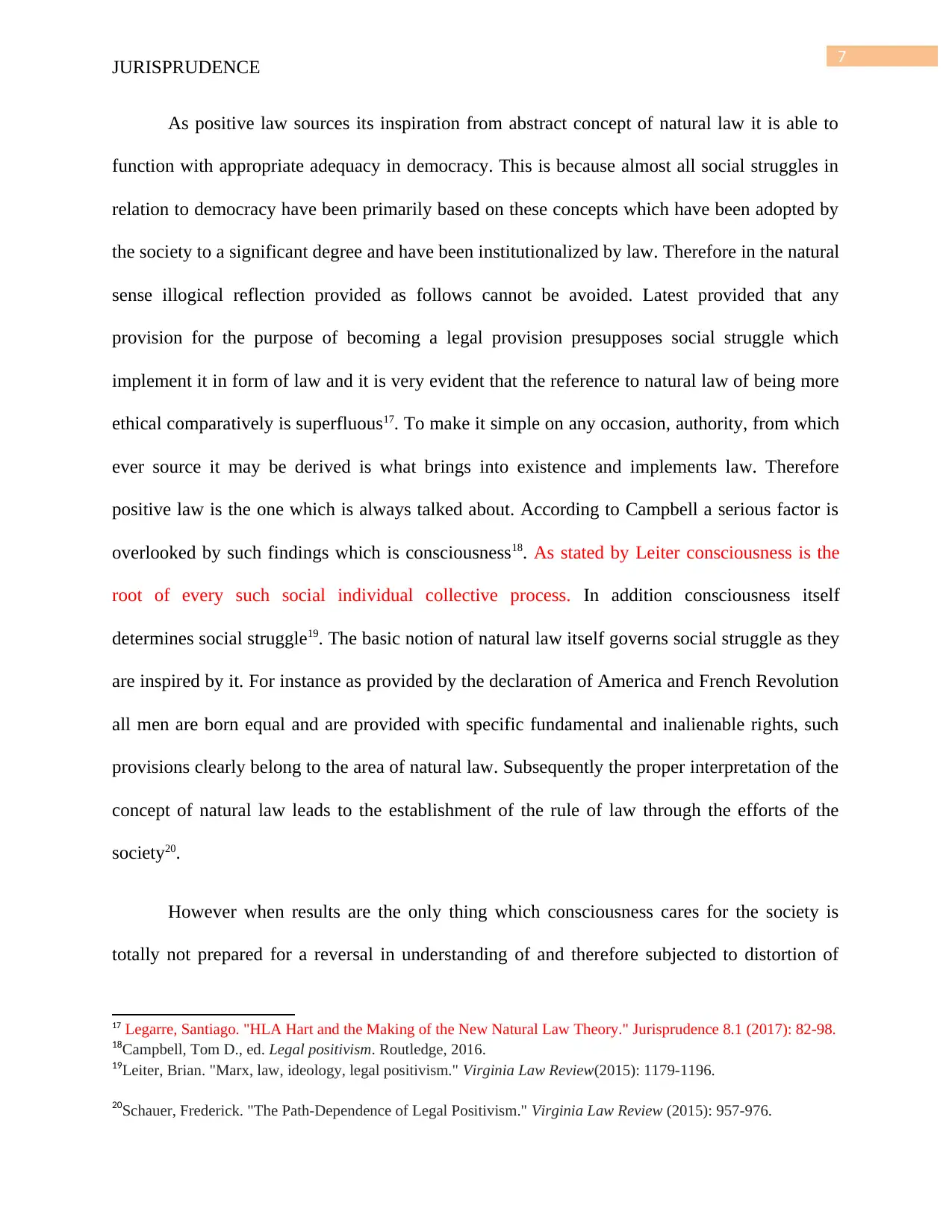
7
JURISPRUDENCE
As positive law sources its inspiration from abstract concept of natural law it is able to
function with appropriate adequacy in democracy. This is because almost all social struggles in
relation to democracy have been primarily based on these concepts which have been adopted by
the society to a significant degree and have been institutionalized by law. Therefore in the natural
sense illogical reflection provided as follows cannot be avoided. Latest provided that any
provision for the purpose of becoming a legal provision presupposes social struggle which
implement it in form of law and it is very evident that the reference to natural law of being more
ethical comparatively is superfluous17. To make it simple on any occasion, authority, from which
ever source it may be derived is what brings into existence and implements law. Therefore
positive law is the one which is always talked about. According to Campbell a serious factor is
overlooked by such findings which is consciousness18. As stated by Leiter consciousness is the
root of every such social individual collective process. In addition consciousness itself
determines social struggle19. The basic notion of natural law itself governs social struggle as they
are inspired by it. For instance as provided by the declaration of America and French Revolution
all men are born equal and are provided with specific fundamental and inalienable rights, such
provisions clearly belong to the area of natural law. Subsequently the proper interpretation of the
concept of natural law leads to the establishment of the rule of law through the efforts of the
society20.
However when results are the only thing which consciousness cares for the society is
totally not prepared for a reversal in understanding of and therefore subjected to distortion of
17 Legarre, Santiago. "HLA Hart and the Making of the New Natural Law Theory." Jurisprudence 8.1 (2017): 82-98.
18Campbell, Tom D., ed. Legal positivism. Routledge, 2016.
19Leiter, Brian. "Marx, law, ideology, legal positivism." Virginia Law Review(2015): 1179-1196.
20Schauer, Frederick. "The Path-Dependence of Legal Positivism." Virginia Law Review (2015): 957-976.
JURISPRUDENCE
As positive law sources its inspiration from abstract concept of natural law it is able to
function with appropriate adequacy in democracy. This is because almost all social struggles in
relation to democracy have been primarily based on these concepts which have been adopted by
the society to a significant degree and have been institutionalized by law. Therefore in the natural
sense illogical reflection provided as follows cannot be avoided. Latest provided that any
provision for the purpose of becoming a legal provision presupposes social struggle which
implement it in form of law and it is very evident that the reference to natural law of being more
ethical comparatively is superfluous17. To make it simple on any occasion, authority, from which
ever source it may be derived is what brings into existence and implements law. Therefore
positive law is the one which is always talked about. According to Campbell a serious factor is
overlooked by such findings which is consciousness18. As stated by Leiter consciousness is the
root of every such social individual collective process. In addition consciousness itself
determines social struggle19. The basic notion of natural law itself governs social struggle as they
are inspired by it. For instance as provided by the declaration of America and French Revolution
all men are born equal and are provided with specific fundamental and inalienable rights, such
provisions clearly belong to the area of natural law. Subsequently the proper interpretation of the
concept of natural law leads to the establishment of the rule of law through the efforts of the
society20.
However when results are the only thing which consciousness cares for the society is
totally not prepared for a reversal in understanding of and therefore subjected to distortion of
17 Legarre, Santiago. "HLA Hart and the Making of the New Natural Law Theory." Jurisprudence 8.1 (2017): 82-98.
18Campbell, Tom D., ed. Legal positivism. Routledge, 2016.
19Leiter, Brian. "Marx, law, ideology, legal positivism." Virginia Law Review(2015): 1179-1196.
20Schauer, Frederick. "The Path-Dependence of Legal Positivism." Virginia Law Review (2015): 957-976.
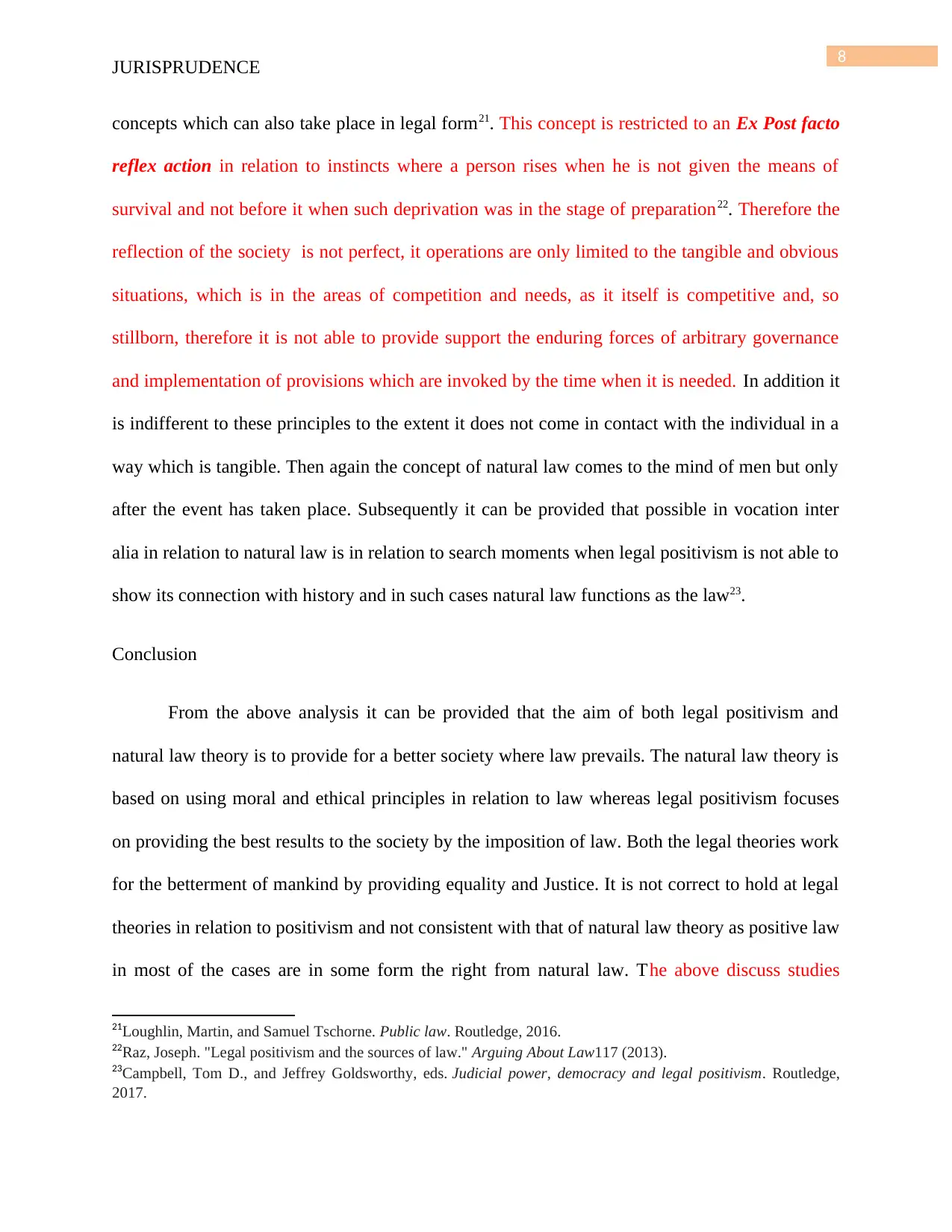
8
JURISPRUDENCE
concepts which can also take place in legal form21. This concept is restricted to an Ex Post facto
reflex action in relation to instincts where a person rises when he is not given the means of
survival and not before it when such deprivation was in the stage of preparation22. Therefore the
reflection of the society is not perfect, it operations are only limited to the tangible and obvious
situations, which is in the areas of competition and needs, as it itself is competitive and, so
stillborn, therefore it is not able to provide support the enduring forces of arbitrary governance
and implementation of provisions which are invoked by the time when it is needed. In addition it
is indifferent to these principles to the extent it does not come in contact with the individual in a
way which is tangible. Then again the concept of natural law comes to the mind of men but only
after the event has taken place. Subsequently it can be provided that possible in vocation inter
alia in relation to natural law is in relation to search moments when legal positivism is not able to
show its connection with history and in such cases natural law functions as the law23.
Conclusion
From the above analysis it can be provided that the aim of both legal positivism and
natural law theory is to provide for a better society where law prevails. The natural law theory is
based on using moral and ethical principles in relation to law whereas legal positivism focuses
on providing the best results to the society by the imposition of law. Both the legal theories work
for the betterment of mankind by providing equality and Justice. It is not correct to hold at legal
theories in relation to positivism and not consistent with that of natural law theory as positive law
in most of the cases are in some form the right from natural law. The above discuss studies
21Loughlin, Martin, and Samuel Tschorne. Public law. Routledge, 2016.
22Raz, Joseph. "Legal positivism and the sources of law." Arguing About Law117 (2013).
23Campbell, Tom D., and Jeffrey Goldsworthy, eds. Judicial power, democracy and legal positivism. Routledge,
2017.
JURISPRUDENCE
concepts which can also take place in legal form21. This concept is restricted to an Ex Post facto
reflex action in relation to instincts where a person rises when he is not given the means of
survival and not before it when such deprivation was in the stage of preparation22. Therefore the
reflection of the society is not perfect, it operations are only limited to the tangible and obvious
situations, which is in the areas of competition and needs, as it itself is competitive and, so
stillborn, therefore it is not able to provide support the enduring forces of arbitrary governance
and implementation of provisions which are invoked by the time when it is needed. In addition it
is indifferent to these principles to the extent it does not come in contact with the individual in a
way which is tangible. Then again the concept of natural law comes to the mind of men but only
after the event has taken place. Subsequently it can be provided that possible in vocation inter
alia in relation to natural law is in relation to search moments when legal positivism is not able to
show its connection with history and in such cases natural law functions as the law23.
Conclusion
From the above analysis it can be provided that the aim of both legal positivism and
natural law theory is to provide for a better society where law prevails. The natural law theory is
based on using moral and ethical principles in relation to law whereas legal positivism focuses
on providing the best results to the society by the imposition of law. Both the legal theories work
for the betterment of mankind by providing equality and Justice. It is not correct to hold at legal
theories in relation to positivism and not consistent with that of natural law theory as positive law
in most of the cases are in some form the right from natural law. The above discuss studies
21Loughlin, Martin, and Samuel Tschorne. Public law. Routledge, 2016.
22Raz, Joseph. "Legal positivism and the sources of law." Arguing About Law117 (2013).
23Campbell, Tom D., and Jeffrey Goldsworthy, eds. Judicial power, democracy and legal positivism. Routledge,
2017.
⊘ This is a preview!⊘
Do you want full access?
Subscribe today to unlock all pages.

Trusted by 1+ million students worldwide
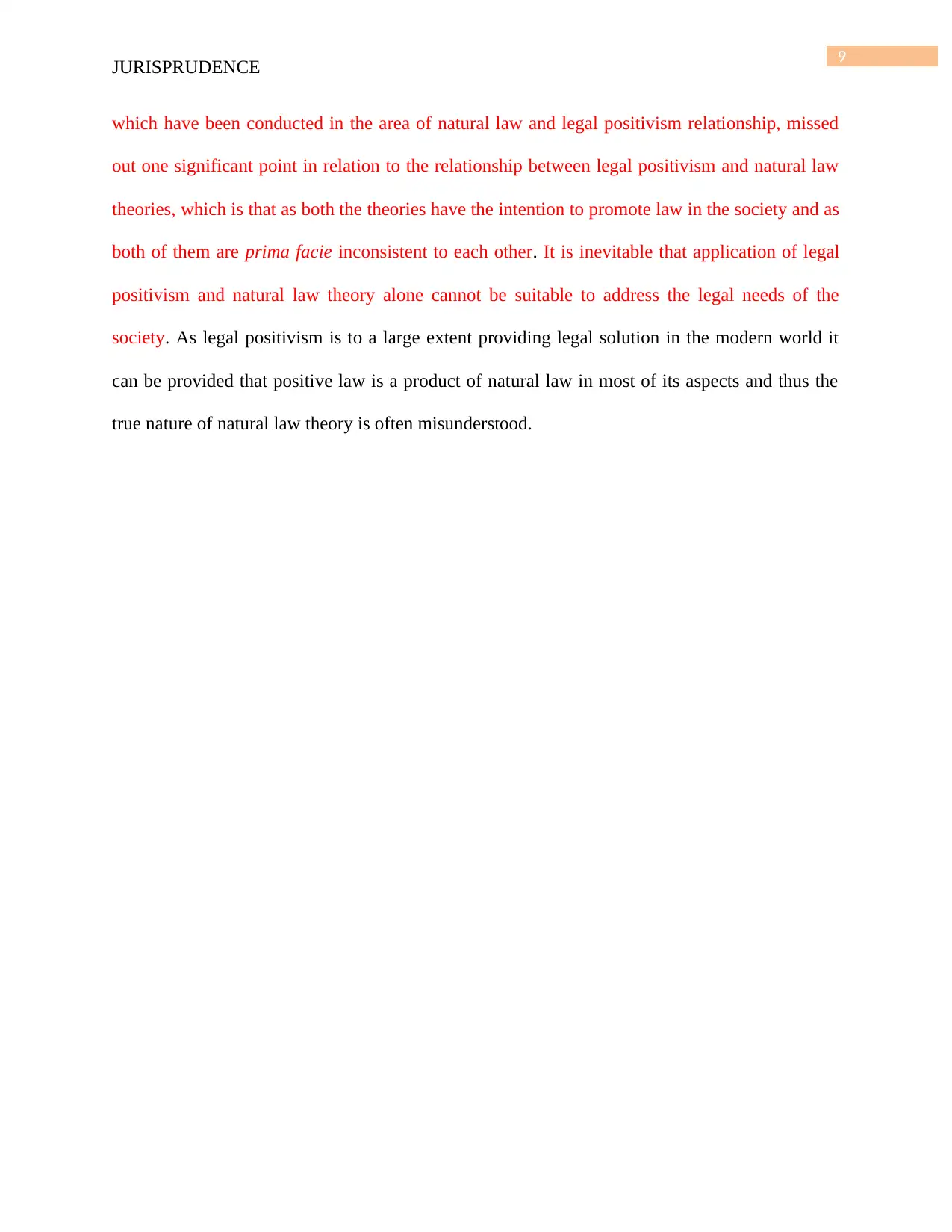
9
JURISPRUDENCE
which have been conducted in the area of natural law and legal positivism relationship, missed
out one significant point in relation to the relationship between legal positivism and natural law
theories, which is that as both the theories have the intention to promote law in the society and as
both of them are prima facie inconsistent to each other. It is inevitable that application of legal
positivism and natural law theory alone cannot be suitable to address the legal needs of the
society. As legal positivism is to a large extent providing legal solution in the modern world it
can be provided that positive law is a product of natural law in most of its aspects and thus the
true nature of natural law theory is often misunderstood.
JURISPRUDENCE
which have been conducted in the area of natural law and legal positivism relationship, missed
out one significant point in relation to the relationship between legal positivism and natural law
theories, which is that as both the theories have the intention to promote law in the society and as
both of them are prima facie inconsistent to each other. It is inevitable that application of legal
positivism and natural law theory alone cannot be suitable to address the legal needs of the
society. As legal positivism is to a large extent providing legal solution in the modern world it
can be provided that positive law is a product of natural law in most of its aspects and thus the
true nature of natural law theory is often misunderstood.
Paraphrase This Document
Need a fresh take? Get an instant paraphrase of this document with our AI Paraphraser
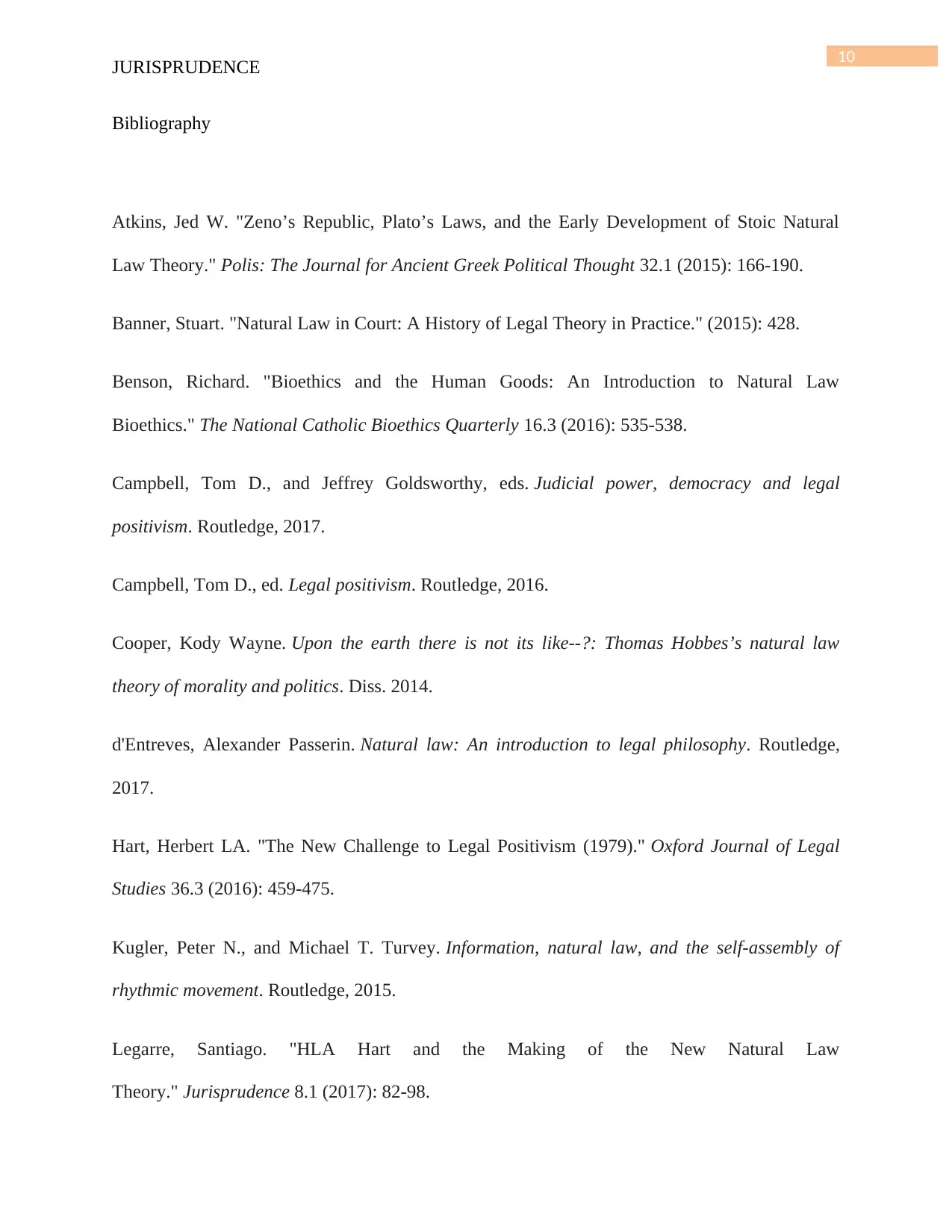
10
JURISPRUDENCE
Bibliography
Atkins, Jed W. "Zeno’s Republic, Plato’s Laws, and the Early Development of Stoic Natural
Law Theory." Polis: The Journal for Ancient Greek Political Thought 32.1 (2015): 166-190.
Banner, Stuart. "Natural Law in Court: A History of Legal Theory in Practice." (2015): 428.
Benson, Richard. "Bioethics and the Human Goods: An Introduction to Natural Law
Bioethics." The National Catholic Bioethics Quarterly 16.3 (2016): 535-538.
Campbell, Tom D., and Jeffrey Goldsworthy, eds. Judicial power, democracy and legal
positivism. Routledge, 2017.
Campbell, Tom D., ed. Legal positivism. Routledge, 2016.
Cooper, Kody Wayne. Upon the earth there is not its like--?: Thomas Hobbes’s natural law
theory of morality and politics. Diss. 2014.
d'Entreves, Alexander Passerin. Natural law: An introduction to legal philosophy. Routledge,
2017.
Hart, Herbert LA. "The New Challenge to Legal Positivism (1979)." Oxford Journal of Legal
Studies 36.3 (2016): 459-475.
Kugler, Peter N., and Michael T. Turvey. Information, natural law, and the self-assembly of
rhythmic movement. Routledge, 2015.
Legarre, Santiago. "HLA Hart and the Making of the New Natural Law
Theory." Jurisprudence 8.1 (2017): 82-98.
JURISPRUDENCE
Bibliography
Atkins, Jed W. "Zeno’s Republic, Plato’s Laws, and the Early Development of Stoic Natural
Law Theory." Polis: The Journal for Ancient Greek Political Thought 32.1 (2015): 166-190.
Banner, Stuart. "Natural Law in Court: A History of Legal Theory in Practice." (2015): 428.
Benson, Richard. "Bioethics and the Human Goods: An Introduction to Natural Law
Bioethics." The National Catholic Bioethics Quarterly 16.3 (2016): 535-538.
Campbell, Tom D., and Jeffrey Goldsworthy, eds. Judicial power, democracy and legal
positivism. Routledge, 2017.
Campbell, Tom D., ed. Legal positivism. Routledge, 2016.
Cooper, Kody Wayne. Upon the earth there is not its like--?: Thomas Hobbes’s natural law
theory of morality and politics. Diss. 2014.
d'Entreves, Alexander Passerin. Natural law: An introduction to legal philosophy. Routledge,
2017.
Hart, Herbert LA. "The New Challenge to Legal Positivism (1979)." Oxford Journal of Legal
Studies 36.3 (2016): 459-475.
Kugler, Peter N., and Michael T. Turvey. Information, natural law, and the self-assembly of
rhythmic movement. Routledge, 2015.
Legarre, Santiago. "HLA Hart and the Making of the New Natural Law
Theory." Jurisprudence 8.1 (2017): 82-98.
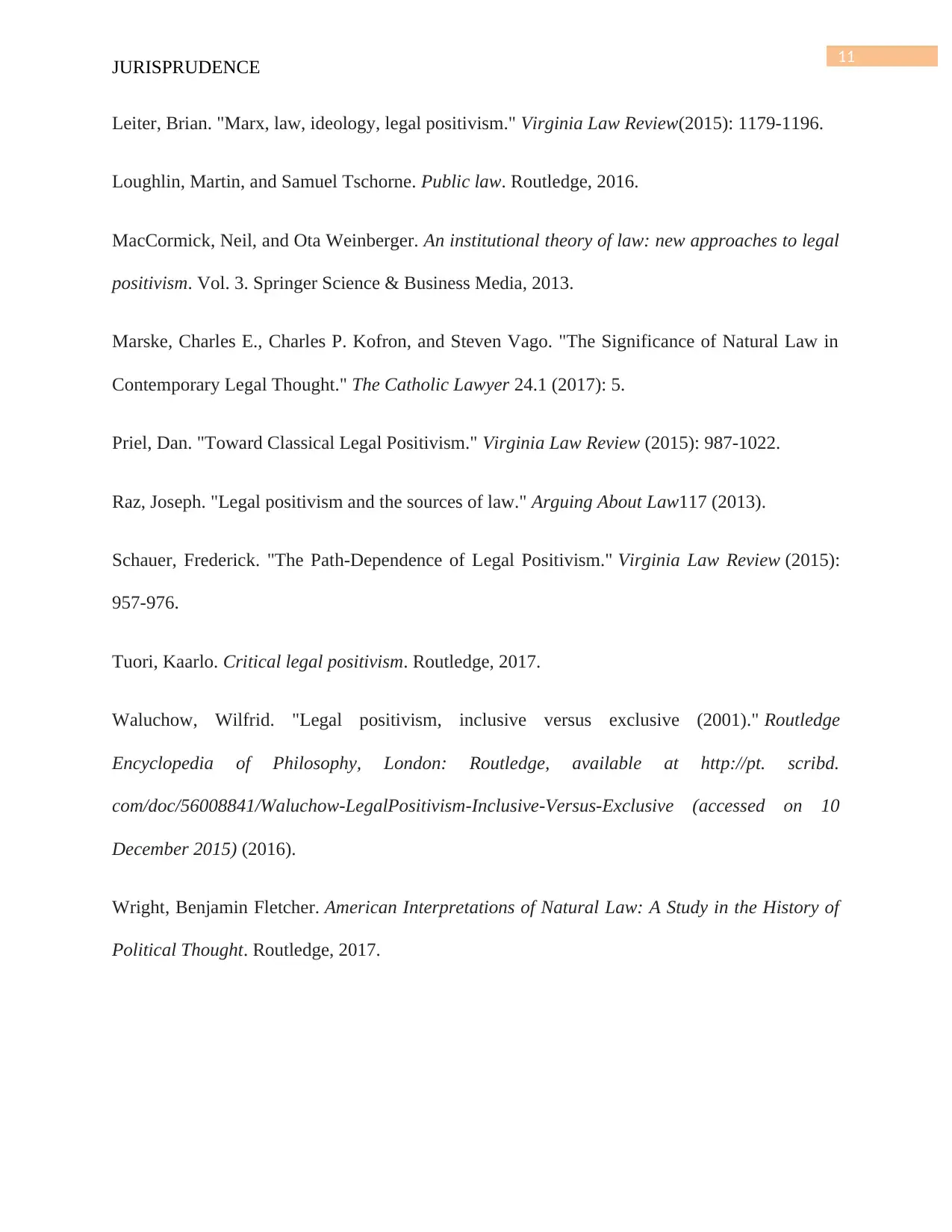
11
JURISPRUDENCE
Leiter, Brian. "Marx, law, ideology, legal positivism." Virginia Law Review(2015): 1179-1196.
Loughlin, Martin, and Samuel Tschorne. Public law. Routledge, 2016.
MacCormick, Neil, and Ota Weinberger. An institutional theory of law: new approaches to legal
positivism. Vol. 3. Springer Science & Business Media, 2013.
Marske, Charles E., Charles P. Kofron, and Steven Vago. "The Significance of Natural Law in
Contemporary Legal Thought." The Catholic Lawyer 24.1 (2017): 5.
Priel, Dan. "Toward Classical Legal Positivism." Virginia Law Review (2015): 987-1022.
Raz, Joseph. "Legal positivism and the sources of law." Arguing About Law117 (2013).
Schauer, Frederick. "The Path-Dependence of Legal Positivism." Virginia Law Review (2015):
957-976.
Tuori, Kaarlo. Critical legal positivism. Routledge, 2017.
Waluchow, Wilfrid. "Legal positivism, inclusive versus exclusive (2001)." Routledge
Encyclopedia of Philosophy, London: Routledge, available at http://pt. scribd.
com/doc/56008841/Waluchow-LegalPositivism-Inclusive-Versus-Exclusive (accessed on 10
December 2015) (2016).
Wright, Benjamin Fletcher. American Interpretations of Natural Law: A Study in the History of
Political Thought. Routledge, 2017.
JURISPRUDENCE
Leiter, Brian. "Marx, law, ideology, legal positivism." Virginia Law Review(2015): 1179-1196.
Loughlin, Martin, and Samuel Tschorne. Public law. Routledge, 2016.
MacCormick, Neil, and Ota Weinberger. An institutional theory of law: new approaches to legal
positivism. Vol. 3. Springer Science & Business Media, 2013.
Marske, Charles E., Charles P. Kofron, and Steven Vago. "The Significance of Natural Law in
Contemporary Legal Thought." The Catholic Lawyer 24.1 (2017): 5.
Priel, Dan. "Toward Classical Legal Positivism." Virginia Law Review (2015): 987-1022.
Raz, Joseph. "Legal positivism and the sources of law." Arguing About Law117 (2013).
Schauer, Frederick. "The Path-Dependence of Legal Positivism." Virginia Law Review (2015):
957-976.
Tuori, Kaarlo. Critical legal positivism. Routledge, 2017.
Waluchow, Wilfrid. "Legal positivism, inclusive versus exclusive (2001)." Routledge
Encyclopedia of Philosophy, London: Routledge, available at http://pt. scribd.
com/doc/56008841/Waluchow-LegalPositivism-Inclusive-Versus-Exclusive (accessed on 10
December 2015) (2016).
Wright, Benjamin Fletcher. American Interpretations of Natural Law: A Study in the History of
Political Thought. Routledge, 2017.
⊘ This is a preview!⊘
Do you want full access?
Subscribe today to unlock all pages.

Trusted by 1+ million students worldwide
1 out of 12
Related Documents
Your All-in-One AI-Powered Toolkit for Academic Success.
+13062052269
info@desklib.com
Available 24*7 on WhatsApp / Email
![[object Object]](/_next/static/media/star-bottom.7253800d.svg)
Unlock your academic potential
Copyright © 2020–2026 A2Z Services. All Rights Reserved. Developed and managed by ZUCOL.





